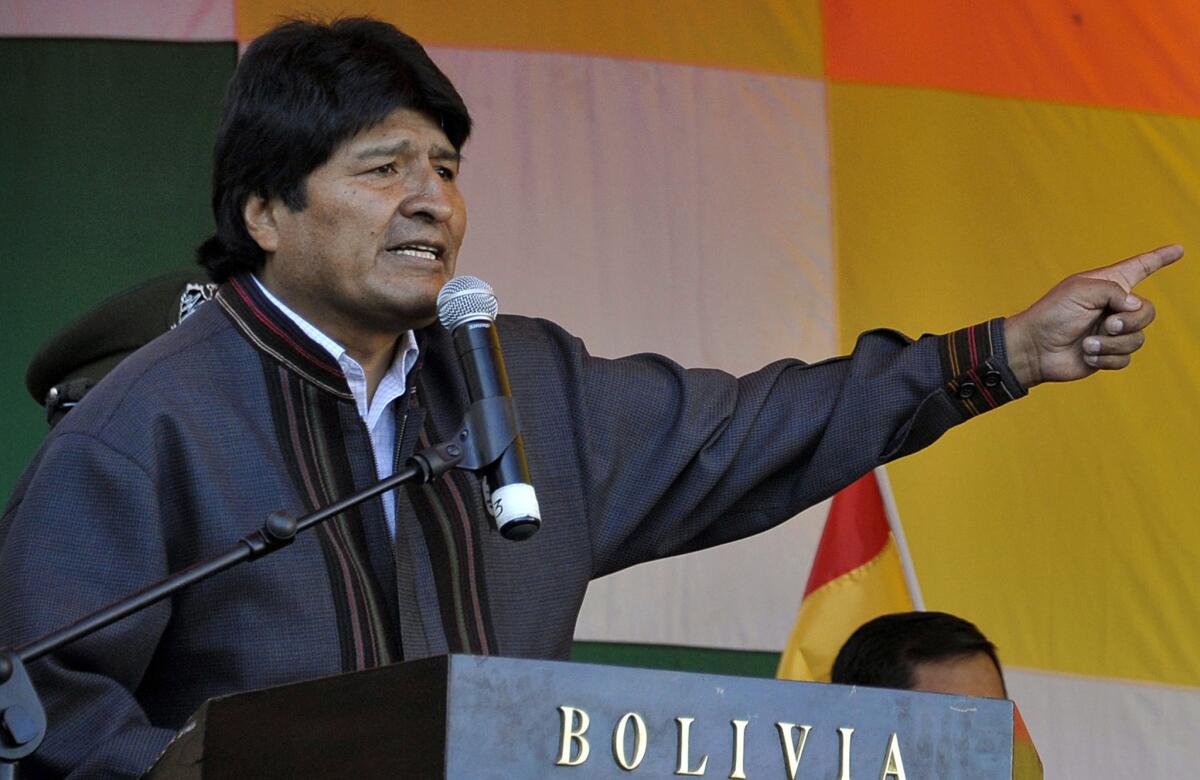Bolivia, angered by Kerry, says it is ejecting U.S. aid agency

This post has been updated. Please see the notes below for details.
Bolivian President Evo Morales declared Wednesday he was expelling the U.S. Agency for International Development from the country, accusing the aid agency of conspiring against his government.
“Surely to think that you can still manipulate us economically, politically -- those times are past,” Morales said at May Day celebrations in La Paz, according to the Bolivian national news agency.
The Bolivian leader asserted that USAID had sown divisions and destabilized the country and his government. Ejecting USAID was also a message to U.S. Secretary of State John F. Kerry, “who says that Latin America is the backyard of the United States,” Morales said.
Kerry referred to the Western Hemisphere as “our backyard” during a House Foreign Affairs Committee hearing last month. Though Kerry went on to say that the region was “critical to us” and stressed the U.S. should reach out to countries there, Morales and other leftists saw his words as an condescending sign of disrespect from Washington.
In light of his words, “we are going to have to seriously analyze the presence of USAID and the U.S. Embassy,” Morales was quoted as saying in the Pagina Siete newspaper last month. Their presence is “an open provocation ... to countries that have liberated themselves from imperialism.”
The U.S. government rejects “the baseless allegations made by the Bolivian government,” State Department acting deputy spokesman Patrick Ventrell told reporters at a daily briefing Wednesday.
“The people who suffer because of this are the Bolivian people who were receiving our assistance,” Ventrell said. When asked about the “backyard” remarks, Ventrell added Kerry had been talking “about us being neighbors.”
Expelling the aid agency is the latest in a series of steps by Morales to push out those tied to the U.S. government. The president, a former union leader for coca farmers, had sparred with the U.S. over its drug eradication strategies. Five years ago, he expelled the U.S. ambassador and Drug Enforcement Administration agents, alleging they had colluded with his political opponents in Bolivia.
“It’s the ambassador’s job to meet with people both from the government and the opposition,” said Michael Shifter, president of the Inter-American Dialogue think tank in Washington. But in Bolivia, “engaging with the opposition is seen as an effort to try to change the government. ... Morales has used this as a way to drum up support among his base.”
Morales did not spell out Wednesday exactly what USAID had done to trigger its expulsion. The Bolivian government has previously accused the agency of conspiring with indigenous activists protesting against a planned highway, claiming it was a way of undermining Morales and his allies.
The protests posed a political crisis for Morales, the first indigenous president of his country, who rose to power on his reputation as a defender of the poor and champion of the environment.
Mark Weisbrot, co-director of the Center for Economic and Policy Research, said the biggest sticking point between the Bolivian government and USAID was the agency’s refusal to reveal which groups it funded. Bolivia has reason to be suspicious of U.S. groups, Weisbrot said, pointing to past reports, denied by U.S. officials, that Peace Corps volunteers were asked to spy on Cubans and Venezuelans there.
In a statement issued Wednesday, USAID said all of its programs supported a national development plan created by the Bolivian government and were “fully coordinated with appropriate government agencies.” It did not immediately answer a Los Angeles Times request for comment on specific allegations, but echoed the State Department in calling the Bolivian accusations “baseless.”
“The United States government has worked in a dedicated fashion over the past five years to establish a relationship based on mutual respect, dialogue, and cooperation with the Bolivian government,” it stated. “ This action is further demonstration that the Bolivian government is not interested in that vision.”
[Updated 3:06 p.m. May 1: Mark Lopes, USAID deputy assistant administrator for Latin America and the Caribbean, told The Times in a telephone interview later Wednesday that the agency regularly briefs local and national government officials in Bolivia on its activities, including “who we work with and what we do and what amounts we provide.”]
Morales said he had asked Foreign Minister David Choquehuanca to immediately communicate his message to the U.S. Embassy in La Paz, which could not be immediately reached for comment. [Updated 3:06 p.m. May 1: The State Department said later Wednesday that the embassy was told that USAID would have a “reasonable” amount of time to end operations, but no further details about timing were given.]
The aid agency has worked in Bolivia since 1964, running programs to improve health, protect biodiversity and provide sustainable sources of income for local residents, it said. USAID had a budget of more than $26 million in Bolivia in fiscal year 2011.
Morales told reporters Wednesday that Bolivia was capable of supporting the projects that USAID had funded.
ALSO:
Russia, Japan renew quest for elusive WWII peace treaty
Syria’s Assad will not be abandoned, Hezbollah leader says
Activists urge Obama to speak out on Mexico’s human rights record
More to Read
Sign up for Essential California
The most important California stories and recommendations in your inbox every morning.
You may occasionally receive promotional content from the Los Angeles Times.










